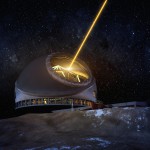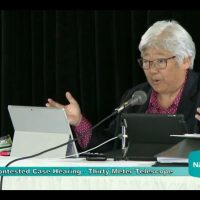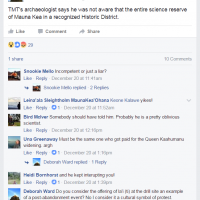With a few notable exceptions the petitioners in the ongoing TMT contested case hearing are lay people with no background in astronomy or the natural sciences around which much of the testimony concerns. Sometimes this disparity results in innocent misunderstandings, something to be expected. Unfortunately in this case these misunderstandings are all too often used to justify ugly insinuations or even accusations of misconduct by telescope opponents.

Some of the misunderstandings can be subtle and not as obvious… One of the most notable examples I spotted, that many may have missed, was the term “checklist”. When Brannon Kealoha was questioning Dr. Clifford Smith, he asked about using checklists to complete some field work. It was apparent that Mr. Kealoha was asking about the process by which the work was done. He did not know that to a botanist like Dr. Smith, that a checklist was not a process by which to work, but rather a list of species known to be present in an area. The complete mis-communication between the two was rather hilarious to an observer who knew why the questions and answers did not match up, with resulting confusion from both. The two were talking about fundamentally different things based on different understandings of a single word.

It is the level of antagonism between opponents and supporters of the project that exacerbates the issue. By and large the professional witnesses are simply being professional. It is when the differences in views occur it becomes difficult to listen to the persistent verbal abuse and veiled accusations they are subjected to on the stand.
It is not uncommon for laypeople to encounter these misunderstandings and in the confusion to accuse the professional of “arrogance” or “elitism” as a result. They fail to understand that professional jargon exists for a reason, it is critically important that concepts be clearly defined in professional communication. Use of odd words borrowed from ancient languages, or different meanings given to otherwise common words, is how this is accomplished.
Almost every pursuit, from science to road construction, uses terms that are unique to that trade. Too often laypersons completely misinterpret the words based on the common usage and when the inevitable confusion begins assume that the professional is wrong or arrogant.
To a certain extent these misunderstandings are completely understandable when a layperson is confronted with a realm of knowledge in which they have no experience. Yet in this case we have a group of people who openly accuse the professionals of misconduct or misrepresentation of the data. So often these accusations hinge upon misunderstandings of the science, or even willful misrepresentation of the science to further their cause.
Willful misrepresentation? Yes. Consider the hydrology argument that opponents have used over and over again, including in the contested case hearings. Recent research has indicated that substantial groundwater present at higher elevations than previously thought. Opponents have used this report to argue that the TMT facility located near the 4000m summit is a threat to groundwater. Yet the science indicates that the groundwater they are referring to lies far below, at less than 2000m elevation. Yet the accusations of TMT damaging the groundwater are a major pillar of the opposition, in complete disregard of any scientific data and the testimony given in the hearing.

Afterwards Mrs. Ward took to her Facebook page to excoriate Mr. Rechtman for not knowing of the designation. Only one problem, the summit is not a designated historic district, either by the State Register of Historic Places or on the National Register of Historic Places. Only the adze quarry has such a designation, not the “entire science reserve”.
Mrs Ward exemplified the attitude of the opponents that is repeatedly seen here, that they know better than the experts. This condescension and arrogance is seen time and again from cross examiners, right up to Mr. Fergestrom’s “You don’t know much!” statement to Dr. Ed Stone on the stand. At least that outburst received censure from Judge Amano.
I expected a little of this attitude on cultural subjects, a place where the experts can have little knowledge of personal practice. But it is repeatedly seen when covering the core technical subjects. Question after question that imply the witness is ignorant or outright lying. Opponents of the project ask for respect, but they do not provide any respect in return. It becomes very difficult to see the opposition in any favorable way, particularly when they have done their very utmost to make the contested case hearing a complete mess. They request a fair hearing, but do everything possible to deny the TMT project a fair hearing in return.


Well done, Andrew.
The other side of the argument is that there are many times when the professional cloaks unethical acts under the guise of “laypeople just wouldn’t understand”.
A few obvious examples of this, drawn from the field of medicine, are the theft of Henrietta Lacks’ tissue, the abuse of John Moore by David Golde, Thomas Stoltz Harvey’s theft of Einstein’s brain, and the Tuskegee Study of Untreated Syphilis in the Negro Male. All were done by “professionals” who claimed the right to do these unethical things in the name of science.
Many would argue that the astronomers have done unethical things on the mountain (e.g., spilling sewage, spilling hydraulic fluid, using lead paint, breaking promises to limit the number of telescopes, etc.). Until the professionals admit that some in their field have erred and do their best to clean up the mess that was created, the layman’s distrust will remain.
Spills happen, the test is in how they are dealt with. Unethical operations would not have reported the spills or cleaned them up. In every case the spills have been reported (thus you know about them) and appropriate steps have been taken to deal with it. The unethical part is a complete characterization that exists only in the minds of you and other protesters. This is the lie that is pushed so hard.
I have never found the telescope limit in actual paperwork, others outside the astronomy community have proposed limits, but the university has never agreed to such. That seems to be another protest myth that is perpetuated through retelling without a basis in fact. The latest CMP limits sites to those already proposed and developed, the only real limit ever promised.